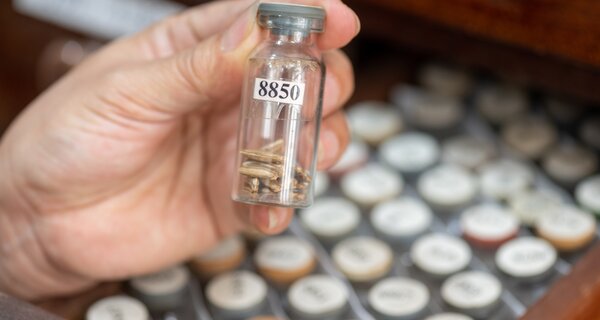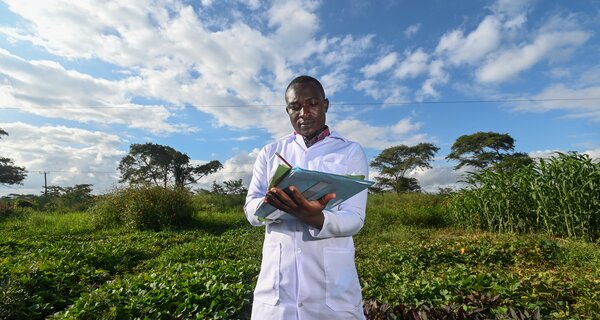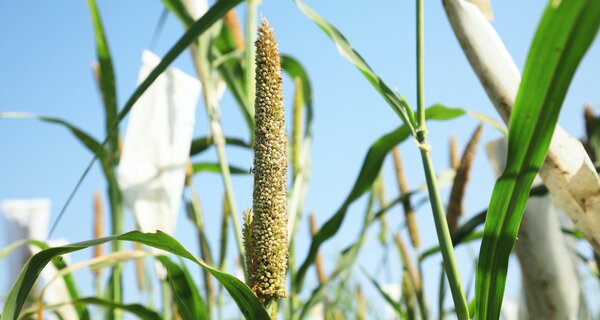A Treasure Trove of Crop Diversity, for Pakistan and the World
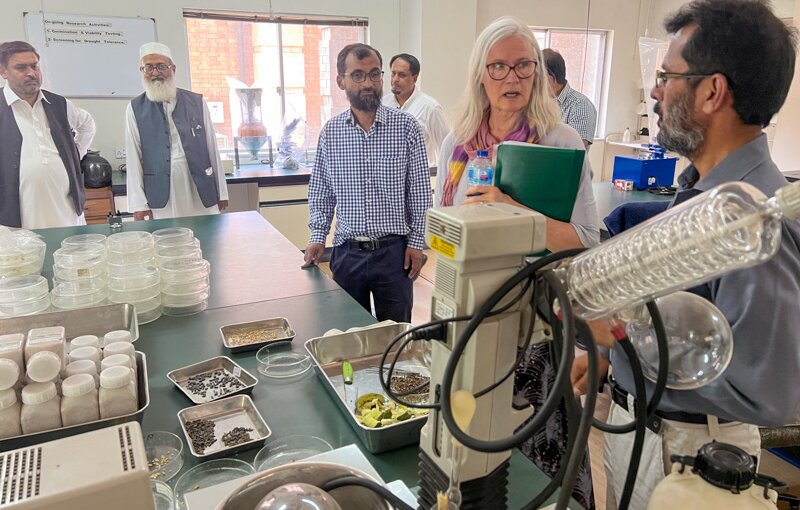 Paula Bramel (center), lead of the Pakistan BOLD review team, discusses germination and viability testing with Dr. Shakeel Ahmed, Curator of the National Genebank of Pakistan (right) and Dr. Asif Javaid, Director, Bio-resources Conservation Institute (left). Photo: Nelissa Jamora
Paula Bramel (center), lead of the Pakistan BOLD review team, discusses germination and viability testing with Dr. Shakeel Ahmed, Curator of the National Genebank of Pakistan (right) and Dr. Asif Javaid, Director, Bio-resources Conservation Institute (left). Photo: Nelissa Jamora10 January 2023
A team of genebank experts visited the Bio-resources Conservation Institute, Islamabad, Pakistan, in June 2022 as part of the Crop Trust's BOLD (Biodiversity for Opportunities, Livelihoods and Development) Project. The review they carried out is the first step in the project’s effort to help its genebank identify areas of operations that need improvement and support. Similar reviews are being carried out in 15 genebanks all around the world.
Pakistan is a vast country with a range of agricultural environments, ranging from low-lying plains where rice is the dominant crop to mountainous areas where fruit trees such as apples and cherries flourish.
The richness of the country’s agricultural flora is well illustrated by the range of crops collected — and safeguarded — by Pakistan's national genebank at the Bio-resources Conservation Institute as part of the Crop Wild Relatives Project. This was a global effort to identify, collect, conserve and make available the diversity of plants related to domesticated crops. In Pakistan, these included alfalfa, apple, barley, carrot, chickpea, eggplant, finger millet, grasspea, lentil, oat, pearl millet, pigeonpea, rice, rye, sorghum, vetch and wheat.
“The importance of Pakistan’s crop diversity is immense,” says Ahmed Amri, emeritus head of the genebank at the International Center for Agricultural Research in the Dry Areas and a member of the BOLD genebank review team. “For example, a recent search for sources of resistance to Sunn pest — one of the most serious pests of wheat and barley in West Asia — turned up only one seed sample with the characteristics we were looking for — and that came from Pakistan.”
Mohammed Shahid, a genebank expert working at the Dubai-based International Center for Biosaline Agriculture and another member of the review team, added that “the Pakistan genebank’s collection of local landraces of cereals, legumes, fruit trees, medicinal plants and other crops makes it unique.”
But it is not complete. Genebank collections never are. And the urgent need to collect and conserve as much crop diversity as possible was recently illustrated by the devastating monsoon floods in Pakistan in 2022. Large areas of the country were flooded for weeks (see image below). Farmers in these areas lost everything, including all the crops in their fields and the seed they had saved for the next planting season. Fortunately, some of their landraces — or farmers’ varieties — had been collected and stored safely in the national genebank and other genebanks around the world. These seeds can be used to return these varieties to the farming communities and help them get started again.
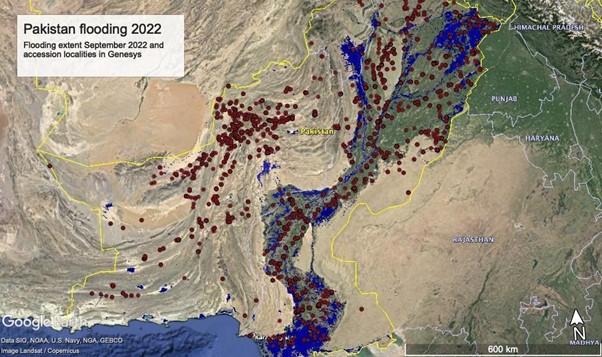
Data from Genesys (https://www.genesys-pgr.org/), a platform that allows users to explore the world's crop diversity conserved in genebanks through a single website, shows where crop diversity has been collected in Pakistan, in relation to the recent floods. Although this map does not include data on the holdings of the National Genebank of Pakistan, it clearly illustrates the risk of loss of crop diversity due to the floods. The BOLD project will help the genebank share its data online.
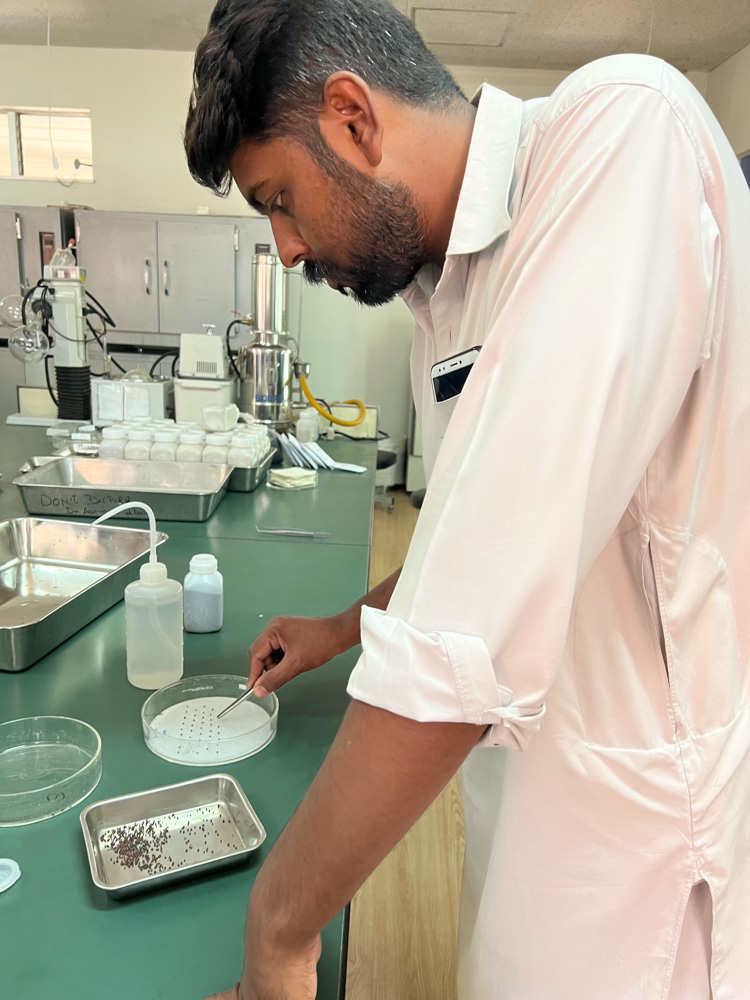
Mr. Hanan Majid, laboratory attendant, plating out seed of brassica for germination testing, national genebank of Pakistan. Photo: Nelissa Jamora
Impressive Facilities
The Plant Genetic Resources Program at the Bio-Resources Conservation Institute, in Islamabad, houses the National Genebank of Pakistan and associated research laboratories, greenhouses, screenhouses and fields.
The buildings and equipment were provided under a project funded by the government of Japan through a technical collaboration project between the Japan International Cooperation Agency and the Pakistan Agricultural Research Council (PARC) between 1993 and 2003.
Today, twenty years later, a lot of the genebank’s equipment is out of service or has broken down and cannot be repaired.
“The genebank staff have shown amazing ingenuity in keeping some of the older equipment and vehicles working,” says Paula Bramel, leader of the BOLD genebank review team. “Some upgrades are really needed, but the genebank has a great baseline to build on.”
Common Challenges
Financial constraints, which are common to most — if not all — genebanks, have led to loss of staff. From about 28 people in the 1990s, the genebank now operates with only eight full-time staff.
“This is putting a huge strain on the remaining staff,” says Bramel, “and PARC really needs to strengthen the genebank by providing resources for more staff.”
Also in common with many other genebanks, the National Genebank of Pakistan is facing a backlog of seed samples needing to be regenerated. Eliminating this backlog is essential to restore the viability of the seeds in storage and to provide enough seed for distribution to users and for safety backup.
“Regeneration is a challenge for many genebanks,” noted Bramel. “It is a key routine operation that has to be done in a timely fashion to ensure the quality and quantity of seed samples. But it is expensive and requires plenty of field space and staff to do it well.”
Enhanced Data Sharing
Managing the copious data on genebank collections is another common challenge. One solution recommended by the review team is to adopt a modern genebank data management system, such as GRIN-Global CE.
“We now have germplasm passport data online and we are working on publishing evaluation and viability data,” says Tariq Rafique, the senior scientist who has been working on the genebank’s catalog.
The next challenge is to share this data through Genesys, an online platform where you can find information about crop diversity conserved in genebanks around the world. “This will help raise the profile of the genebank,” noted Bramel, “and help increase the use of the collection by breeders and other researchers.
Quick Wins
Despite these challenges, the BOLD review team identified a number of quick wins that will enhance the genebank’s operations.
“The existing facilities are impressive and with a few rearrangements and a bit of rehabilitation work they can greatly increase the efficiency of the long-term and medium-term storage conditions,” says Amri.
“These are small changes that can easily be implemented, but will make all the difference to the security of the collection.”
Small Steps, Big Improvements
“We had fruitful discussions with the genebank team and with PARC management,” said Nelissa Jamora, the Crop Trust staff member overseeing the BOLD genebank reviews. “There is clearly a strong commitment to ensuring that the genebank not only plays an important role in Pakistan’s agricultural sector but also contributes to agriculture worldwide.
“The BOLD Project looks forward to contributing to the genebank’s continuing efforts to make sure Pakistan’s crop diversity is safe and available to current and future generations of farmers in the country and around the world.”
Category: BOLD
About the BOLD Project
BOLD (Biodiversity for Opportunities, Livelihoods, and Development) is a major 10-year project to strengthen food and nutrition security worldwide by supporting the conservation and use of crop diversity. The project works with national genebanks, pre-breeding and seed system partners globally. Funded by the government of Norway, BOLD is led by the Crop Trust in partnership with the Norwegian University of Life Sciences and the International Plant Treaty.


